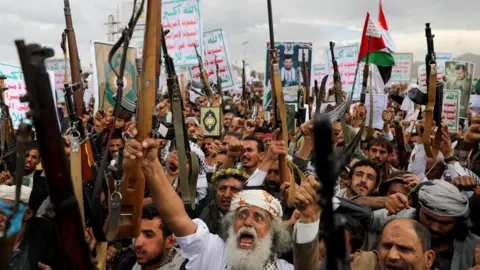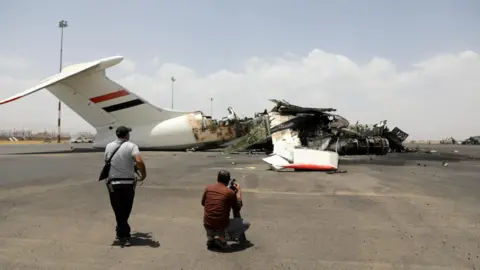Houthis say US 'backed down' and Israel not covered by ceasefire
 Reuters
ReutersA senior Houthi official has rejected US President Donald Trump's claim the Yemeni armed group "capitulated" when agreeing a ceasefire deal, saying the US "backed down" instead.
"What changed is the American position, but our position remains firm," chief negotiator Mohammed Abdul Salam told Houthi-run Al-Masirah TV.
Mediator Oman said the US and Houthis had agreed to "no longer target each other", after seven weeks of intensified US strikes on Yemen in response to Houthi missile and drone attacks on international shipping in the Red Sea.
Abdul Salam also said the deal did not include an end to attacks on Israel, which has conducted two rounds of retaliatory strikes on Yemen this week.
The Houthis' support for the Palestinian people in Gaza "will not change", he added.
The Iran-backed group has controlled much of north-western Yemen since 2014, when they ousted the internationally-recognised government from the capital, Sanaa, and sparked a devastating civil war.
Since November 2023, the Houthis have targeted dozens of merchant vessels with missiles, drones and small boat attacks in the Red Sea and the Gulf of Aden. They have sunk two vessels, seized a third, and killed four crew members.
They have said they are acting in support of the Palestinians in the war between Israel and Hamas in Gaza, and have claimed - often falsely - that they are targeting ships only linked to Israel, the US or the UK.
The Houthis were not deterred by the deployment of Western warships in the Red Sea and Gulf of Aden to protect merchant vessels last year, or by multiple rounds of US strikes on military targets ordered by former President Joe Biden.
On 15 March, Trump ordered an intensification of the air campaign against the Houthis and threatened that they would be "completely annihilated".
At the end of April, the US military said it had struck more than 800 targets, including command-and-control facilities, air defence systems and advanced weapons manufacturing and storage facilities. It also said the strikes had killed hundreds of Houthi fighters and "numerous Houthi leaders", without naming them.
Houthi-run authorities have said the strikes have killed dozens of civilians, but they have reported few casualties among the group's members.
At the White House on Tuesday, Trump announced that the Houthis had said they "don't want to fight anymore".
"They just don't want to fight, and we will honour that and we will stop the bombings, and they have capitulated," he said. "But, more importantly, we will take their word."
"They say they will not be blowing up ships anymore and that's what the purpose of what we were doing."
Later, Omani Foreign Minister Badr Albusaidi wrote on X: "In the future, neither side will target the other, including American vessels, in the Red Sea and Bab al-Mandab Strait, ensuring freedom of navigation and the smooth flow of international commercial shipping."
 Reuters
ReutersOn Wednesday, Mohammed Abdul Salam said Trump's remarks were "a reflection of Washington's frustration after failing to protect Israeli ships and contain the fallout of its involvement".
He also told Reuters news agency that the "the agreement does not include Israel in any way, shape or form".
Israel has also carried out air strikes against the Houthis since July 2024 in response to hundreds of missiles and drones that the Israeli military says have been launched at the country from Yemen.
Most of them have been shot down, but on Sunday a Houthi missile landed near Israel's main international airport, Tel Aviv's Ben Gurion, leaving six people with minor injuries.
The attack has prompted Israel to carry out two rounds of air strikes on what the military called "Houthi terrorist infrastructure".
The first on Monday targeted the Red Sea port of Hudaydah, reportedly destroying docks, warehouses and the customs area. The Houthi-run government's health ministry said four people were killed.
On Tuesday, Israeli jets bombed Yemen's main airport in Sanaa and several power stations.
Sources told Reuters that the runway, three aircraft, the departures hall and a military base were destroyed. Three people were killed, according to the health ministry.
"I have said many times that whoever attacks the State of Israel will pay the price," Israeli Prime Minister Benjamin Netanyahu said.
